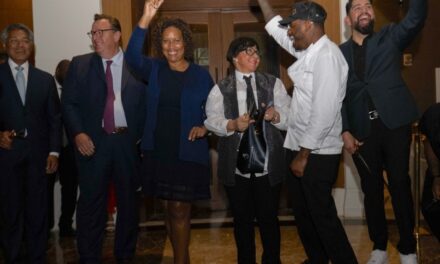By Mylika Scatliffe,
AFRO Women’s Health Writer,
mscatliffe@afro.com
Arsalaan Allgood is a self-defined natural birth advocate. When he witnessed the treatment his mother received while giving birth to his siblings in the hospital, he noticed the lack of nurture and care.
“I didn’t feel like she was treated with much dignity, and it wasn’t a comforting feeling,” said Allgood.
Throughout his teenage years, Allgood reflected on the experience and knew he wanted to be a vessel for change. When he turned 21 years old, and he and his wife were expecting their first child, Allgood decided he and his family would go a different route.
They decided to have the first baby at home, as well as the next eight.
“I want to make home births normal again,” Allgood simply stated.
Allgood says his advocacy for home births is not a business, and he isn’t interested in trying to convince anyone that what works for his family will work for everyone. He doesn’t give medical advice; but he wants Black men and families to consider an alternative.
For centuries, women in rural areas across the southern United States, both Black and White, were treated at home next to their partners by well-respected Black women referred to as “granny midwives.” This term became increasingly popular after childbirth became more medicalized and Black women were not welcome to receive treatment or give birth in segregated hospitals. During the pandemic, many families chose to return to this trend of delivering their children in an intimate space. According to the Pew Research Center, the number of home births rose from 38,506 in 2019 to 45,646 in 2020, reflecting a 19 percent increase.
“Black men have always been a part of the process, beginning with conception, but our role has been purposely reduced by a business model,” said Allgood.
Black women have faced enormous obstacles with successful pregnancies resulting in a maternal health crisis across the United States. Allgood highlighted the alarming death rate of Black women in hospitals during and after childbirth combined with his mother’s experiences, as the motivation behind his work.
“We get to the end of the process, when it’s time for our women to actually give birth, and we release the reins to a stranger, someone they have only known perhaps eight or nine months,” said Allgood.“We take the sense of security away from our women when they need us most. It’s a fight for the safety of our women.”
He went on to detail not only the scientific aspects of childbirth,but how Black mothers can curate their birth experiences to reflect their personal cultural and family traditions, much like he has with his wife when he delivered all nine of his children.
“Home births allow Black women the organic comfort level that comes with not having to make themselves acceptable to hospital staff with no frame of reference for their culture, and not having to feel uncomfortable in asking for whatever they might need for fear of being marginalized,” said Allgood.
A personal birth experience at home can look a lot of different ways, Allgood described.
“Playing music, burning incense, candles, dancing, having a party, whatever works best for your family,” he said.
While Allgood advocates for natural home births attended by Black fathers, he is not speaking in opposition to respected medical institutions.
As a birth doula serving the Maryland, D.C., and Virginia areas, Teneele Bruce is excited to see that more men want to be involved and take a more active role in the birthing process. She believes men can and should be better educated about women’s physical experience all the time, not just in childbirth. Men should also be aware of conditions such as uterine fibroids, polycystic ovarian syndrome, menstruation.
“Women carry babies, but don’t get pregnant alone; men should play more active roles, and not just in the delivery room,” said Bruce. Even in a medical setting, a husband or boyfriend can be active his partner’s labor by asking for and participating in birth planning and discussions. “He can make sure his partner is comfortable and speak up for her when she is not. It’s really lovely to see men involved from conception to the post-partum
phase.”
Childbirth is just the tip of the iceberg where women’s reproductive and sexual health is concerned. Bruce said it is helpful for women if the men in their lives are knowledgeable about what they go through so they can offer genuine support.
“Women can curate their birth experiences wherever they give birth,” she explained. “There are some hospitals that allow dimming of the lights, a woman to wear what she wants or for her to walk around during labor and choose her birthing position rather than just lying on her back.”
Bruce believes home births are beautiful, viable options for women who have healthy and uncomplicated pregnancies, attended by physicians and midwives, but also believes a birth doesn’t have to be at home for a woman to have the birthing experience they want.
She acknowledged that medical staff in hospitals with their scientific training and education, absolutely know there are alternative methods and positions that work with gravity to ease a baby down the birth canal, but they don’t necessarily align with hospitals’ financial goals.
Allgood agreed.
“Less complications, means fewer corrective procedures and surgeries, and left revenue for hospitals. It’s not as good for the business model,” he said.“Exercises and swinging of the hips help to open the chest and pelvis which in turn helps with breathing and relaxation.”
Hugging, kissing, caressing, nipple stimulation, whispering affirmations all can release endorphins to make a laboring woman’s job easier.
“Those same feelings and actions that helped to make the baby in the first place, can make it easier for the baby to get here,” said Bruce.
Bruce and Allgood both advocate for men to surround their laboring women with love, protection and security, particularly Black women who are so often not cherished by the outside world.
The post In the birthing space: why Black men are needed now more than ever appeared first on AFRO American Newspapers .











